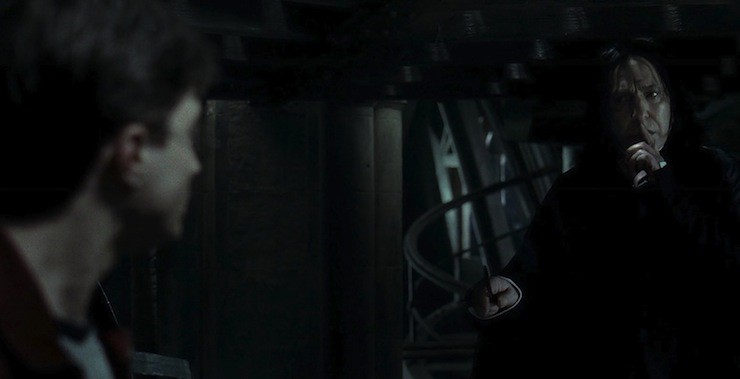This may be the only Potter film that I hadn’t watched since its release in theaters. And that’s because I was distinctly unhappy about it. Having been over six years, I was trying to recall what bothered me so much that I avoided the film for so long—
—I only remembered that it was mostly about the portrayal of Ginny.
This is the rub of trying to translate Half-Blood Prince to film; of all the Potter stories, it is the least cinematic by far. It’s a bunch of flashbacks with romantic subplots thrown in. As a coherent tale with a beginning, middle, and end, it doesn’t exactly work out, so the movie had to refocus a bit. This results in most of the background on Voldemort getting cut (screenwriter Steve Kloves wrote all the memories in at first, but most of them were removed), and a lot more attention to the romance bits… which results in the movie opening with some Death Eater attacks before switching to Harry at a random cafe, reading a wizarding newspaper in front of Muggles, and flirting with a waitress. What a scamp. (Wait, what? We are talking about Harry Potter, aren’t we?)
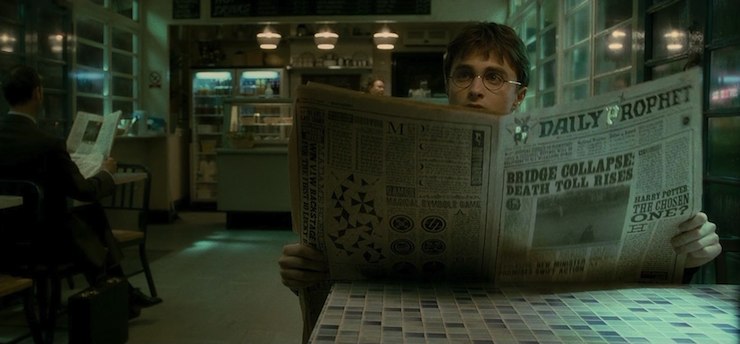
We come to my first pet peeve. Because Harry didn’t play the shouty, angry teenager he was written as in the Order of the Phoenix film, all of his rebelliousness has been relegated to this one, which makes everyone at the top level of the wizarding world seem unforgivably stupid. Sure, we just let Harry Potter leave the house and travel about where-the-hell-ever. That’s probably fine, right? We’re sure it’s fine. We don’t really care. Dumbledore’s just gonna drop him off at the Weasley’s without warning because that’s a, um, secure way of handling things. We have an Order of the Phoenix to help with all this stuff—which we made a big point of introducing in the last film—but we’re going to erase their existence entirely from this tale because that would make everyone look far too competent and on top of things.
This happens again when Harry gets stuck on the Hogwarts Express. The Remus/Tonks subplot has been eliminated (they’re simply together in this film, which is nice for avoiding time-sucking drama, but awkward because Tonks is suddenly styled to look older like they were trying to gloss over the age difference—I guess being in relationships makes colorful, punky people suddenly develop keen interests in muted colors and lumpy frock coats?), so it’s Luna who saves Harry from getting a free ride back to London. And while I’m 100% in favor of Luna getting more to do in this film, the two of them show up at the gate and get no more than a “where have you been?” from Professor Flitwick, and I’m like, really, the flipping Chosen One went missing on his way to school and you’re just standing around with a list and huffing?
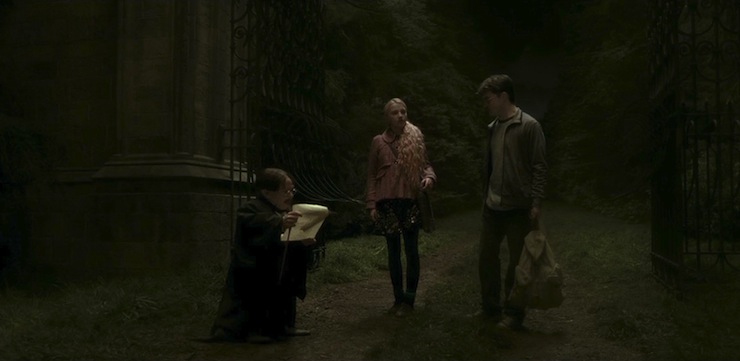
Outside of that, most of the teenage shenanigans are well written and properly realistic, particularly where Ron and Hermione are concerned. (The scene with the birds when Ron and Lavender first hook up. Oof. That one’s right up there with Hermione at the end of the Yule Ball.) And while it’s different from the books, I have always appreciated the extra exchanges between Harry and Hermione, with the two acting more as confidantes to each other, particularly regarding awkward emotional stuff. It doesn’t make up for still undercutting Ron (he’s primarily used for camp and comedy in this film, as per his usual, even though Rupert Grint has reached a point as an actor where he’s clearly ready for more than that), but I think it’s sometimes an improvement over the books; Rowling, for all that I adore her, often writes the trio in that ‘Harry and Ron adore Hermione, but she’s still a girl and therefore they can’t relate so well about certain things’ way, and it feels a bit dated, at least to me. The relationship between Harry and Hermione in the movies reminds me more of my own friendships with the guys I knew growing up, and I think it’s a great example of how boys and girls can be have deep, meaningful friendships without romance.
Tom Felton pulls out all the stops in this film, and Draco’s arc is heartbreaking. He manages to play the role even more sympathetically than its written, and since he spends the majority of his time on screen brooding and crying, it’s really hard not to feel for him. Having his fight with Harry stem from Katie Bell’s return to school sets their little battle in a completely different light—Harry comes upon Draco when he appears to be having an anxiety attack, and it makes Harry seem a slightly more guilty party in the rendering. I actually prefer the sequence of events where Snape doesn’t confront Harry at all about using Sectumsempra, but rather just gives him a piercing look, and lets Harry run off while he heals Draco. It’s different from the text, and makes the whole scenario more unsettling to watch.
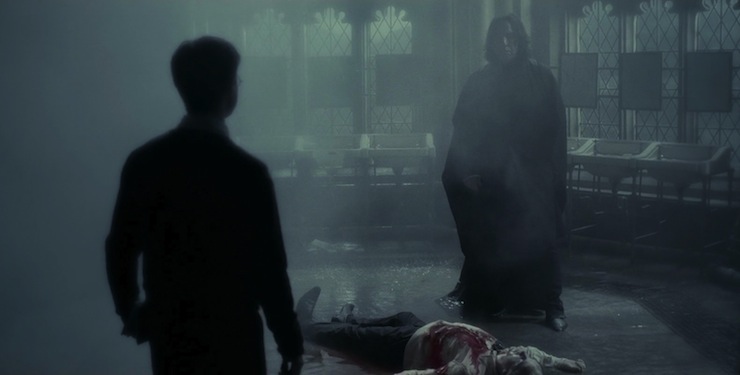
On a wince-worthy aside, this movie got slammed for whitewashing due to what was likely an unfortunate lack of attention: see, in order to make the call sheets—the lists of who has to come to set each day—easier to manage, each extra was often given a character name from the books for reference. (This happens often in films with regular extras who are seen throughout the movie.) As a result, the two girls who held the name of Lavender Brown in the second and third films were black, and they were listed as Lavender in the credits. And then when Lavender had to be cast for this film as an actual speaking role, they cast a white actress. This led to accusations that both the filmmakers and J.K. Rowling had intentionally whitewashed Lavender. While it’s pretty likely that this was simply a matter of oversight, since the creative teams kept changing… it was a really bad oversight on everyone’s part. And it’s too bad because more representation would have been nice in these films. Then again, Lavender is really hard to watch in this film, so maybe it is just as well? She’s written like an adult’s concept of what’s funny about young romance, and that makes her far too camp to take seriously as a human being, which isn’t great.
There are some fascinating and fun behind the scenes bits, however—when Rowling first read the script and found a line where Dumbledore mentioned a girl he’d had a crush on, she wrote a note to Steve Kloves informing him that Dumbledore was gay. Which leads me to assume that the line he gives to Slughorn about taking the Muggle magazine because he “loves knitting patterns” was added in later drafts to suggest just that. (Not that straight guys can’t knit, of course, but it does seem like a winking sort of exchange that has no place there otherwise.) Then there’s a fact that 11-year-old Tom Riddle is played by Ralph Fiennes’ nephew, chosen because David Yates thought he looked a bit like his uncle and had a good haunted quality to him. (Christian Coulson wanted to come back as teenage Riddle, but he was 30 at that point in time, so Yates decided to recast.) Daniel Radcliffe has stated that he dislikes his performance in this film more than any of the others, and I see his point; he seems oddly stiff throughout most of the movie, not on his usual form.
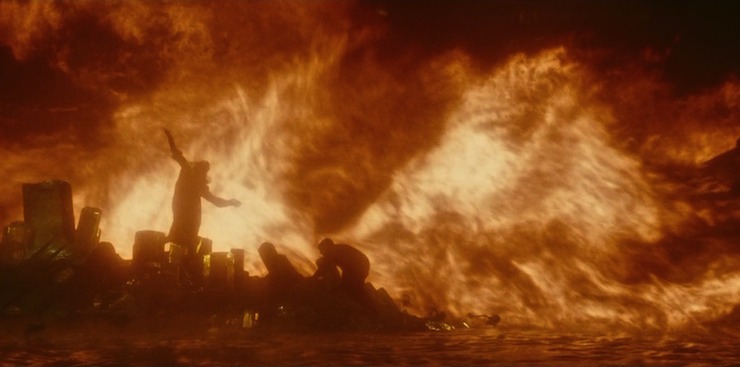
Speaking aesthetically, this film is gorgeous. In fact, it’s the only Potter film that was nominated for an Oscar in Cinematography. Yates hired French cinematographer Bruno Delbonnel, who was known for his particular affinity for earthy color palettes, giving this film a remarkably unified hue. The sequence in the cave is perfectly rendered in every possible detail; the light, the animation for the Inferi, the ring of fire, it all seems to have jumped straight off the pages of the book, and it’s properly disturbing to watch from start to finish.
While we’re on the topic of things I love, here’s a list:
- The look on all the teachers’ faces when Lavender and Hermione fight over Ron’s hospital bed (the fight is ridiculous, but the spectators are all that really matter). Especially Snape’s. And McGonagall’s. But really, it’s all about Snape, he looks SO UNCOMFORTABLE, like no, no no no no, why am I here, my teaching contract specifically states that I never have to witness emotional outbreaks like this, noooooooooooo.
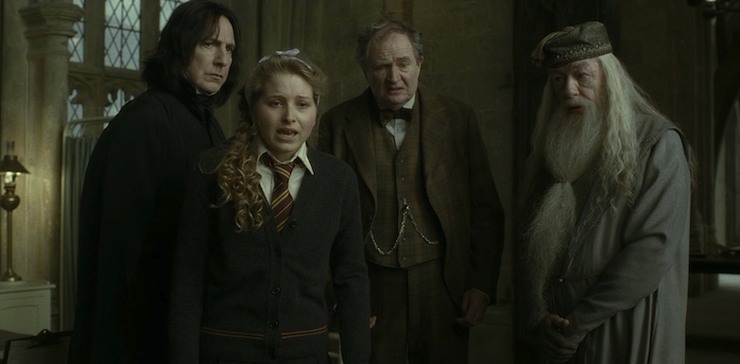
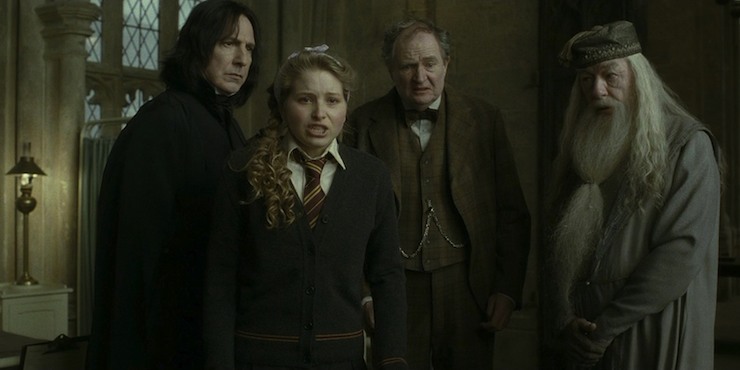
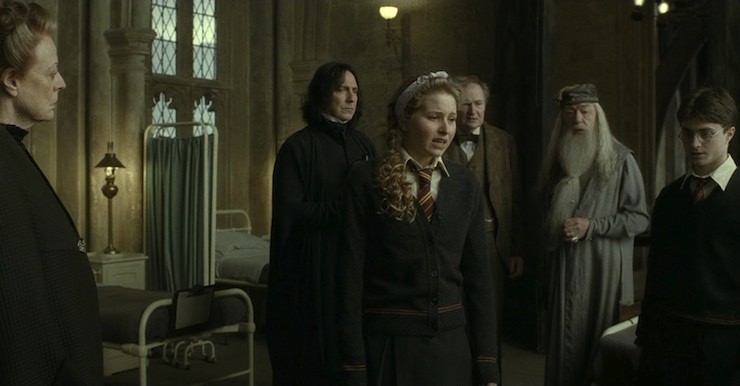
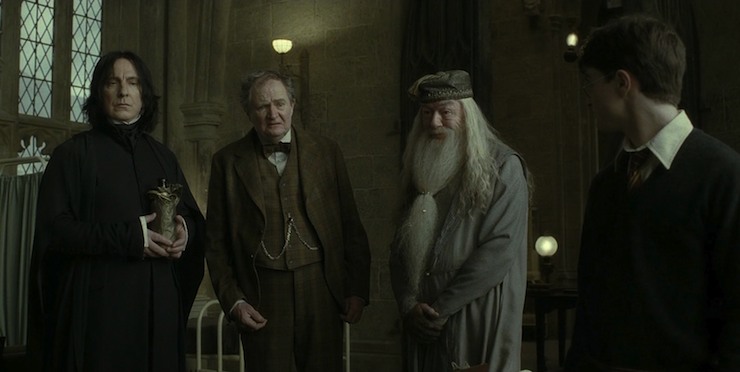
- Draco’s suits. I’m sorry, suit. It’s really just one, and he wears it nearly every day because I guess the Malfoy family assets are frozen and he can’t get more of them made? Or maybe he has a closet of the same suit over and over? Either way, he looks fabulous.
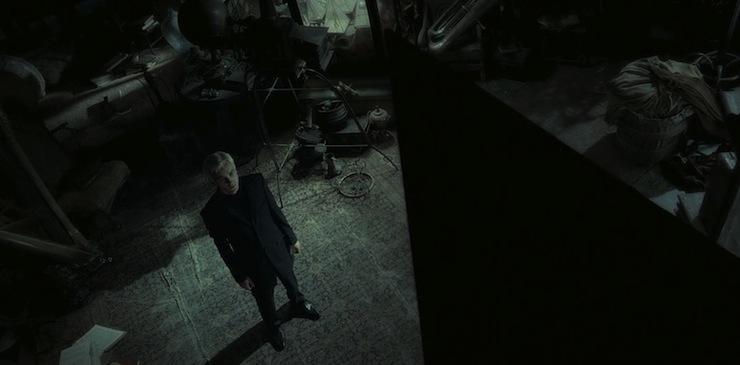
- Seeing Ron be awesome at Quidditch, it just makes me so happy to see it since we don’t really get to see it in the books, and it’s really fun watching Ron be happy for a change.
- Hermione swatting Harry when he starts to get all puffed up about being the Chosen One.
- Ron eating an ENTIRE BOWL OF JELLO. I have no idea how it’s possible for any person to eat that much in one go (though that might be because I hate the stuff), but I have such respect. Also, though Hermione berates him for it, that bowl and the entire platter of pies over the holidays seem to indicate that Ron eats when he’s unsettled. So A+ character choices there.
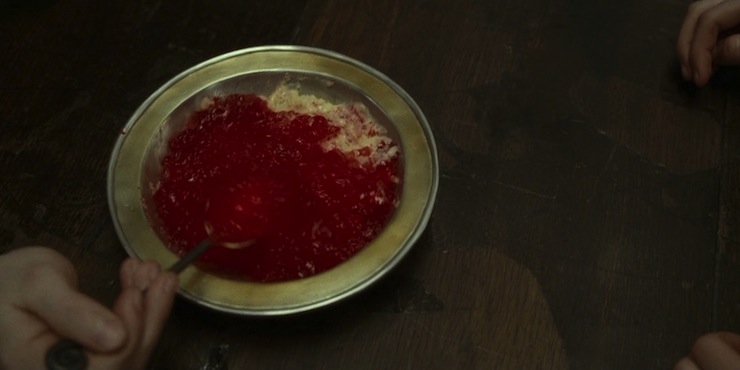
- Harry acting completely high after taking Felix Felicis. Just, no filter, super happy, full of giggles.
- The story about the fish that Lily gave Slughorn, and it vanishing the night she died. What starts off as a drunken rambling from Slughorn turns into a deeply painful admission of loss that manages to humanize the man even further and give Harry the opening he needs to get the memory from him. It’s a smart addition, the good kind of shorthand that film does better.
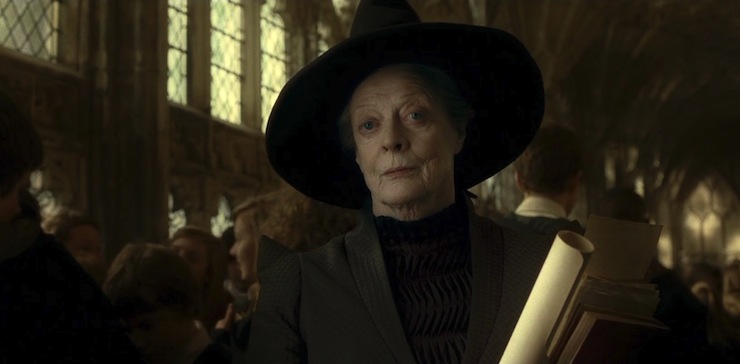
- How McGonagall has reached that point where she’s basically playing the part of Harry’s concerned aunt. Please go take Potions. Please also talk about your feelings. Please take care of yourself.
- Harry telling Hermione that he’s going to take someone cool to Slughorn’s Christmas party, and the film immediately cutting to Luna in this beautifully non-ironic way.
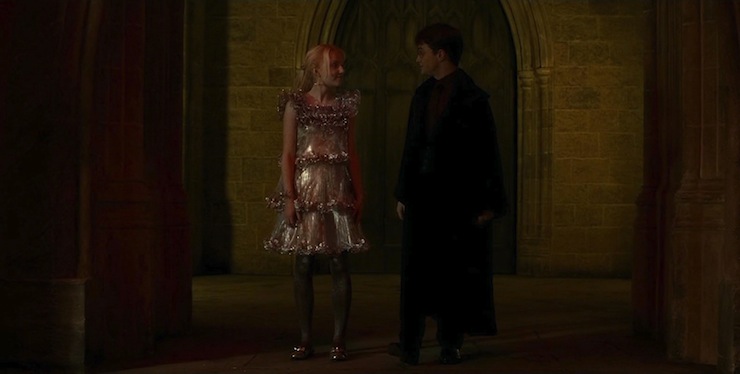
But then there’s the bad of this film. On a rewatch, I’m still completely furious at the depiction of Ginny. It seems as though they maybe ran into the problem with casting here; while Bonnie Wright is perfectly lovely in her own way, she was cast as a small child to play the timid Ginny of the first few books. That’s fine. But as the character is meant to get more outspoken, Wright doesn’t really. Or she doesn’t enough. I’m not certain if the actor was a factor in how Ginny was written, but Steve Kloves commits the ultimate foul in my book—he makes Ginny’s relationship with Harry all about her taking care of him.
The kids are home for the holidays at the Burrow and Ginny’s like, here Harry, let me feed you a tiny pie! Harry looks as perplexed by this request as I feel, but sure. Why not. Tiny pies aren’t exactly a sexy food for wooing, but I will go with this. Then they run into each other on the stair and Ginny is like, oh Harry, your shoe is untied! Let me fix that!
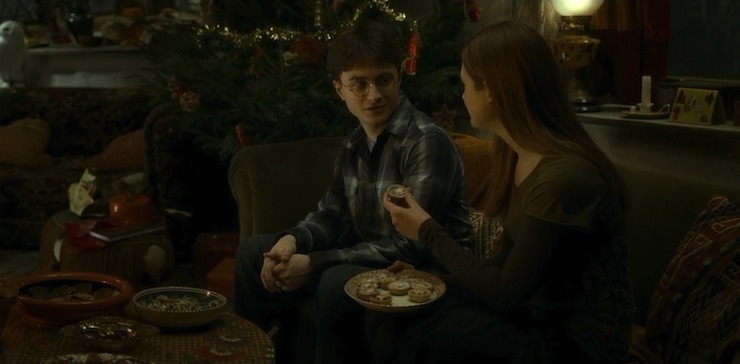
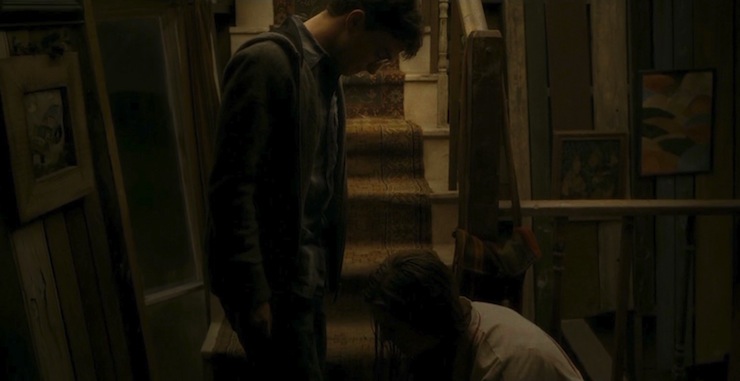
Yeah. This just skewed into uncomfortable territory for me. He’s not a child. He can tie his own damn shoes.
Then the Death Eaters show up (I HATE THIS SEQUENCE) and Harry runs out into the field after Bellatrix like a moron and Ginny follows him, which briefly necessitates her being rescued by him from Fenrir Greyback until she remembers to pull out her own damn wand. Then grumpy!Remus and Tonks and Arthur come to the rescue, and then the Death Eaters set fire to the Burrow, and we linger on this for about two seconds before moving on. This is the Weasley family home. For all intents and purposes, it is also Harry’s home. It’s on fire. And we get one shot of the family looking sad before we skip to a scene where Hermione is all ‘wow, that’s awful, it’s so easy for them to get to you’ and I’m like I AGREE WITH YOU HERMIONE, IT IS TOTALLY RIDICULOUS THAT THE DEATH EATERS COULD JUST POP BY TO SAY HELLO AND EVERYONE IS STILL ALIVE.
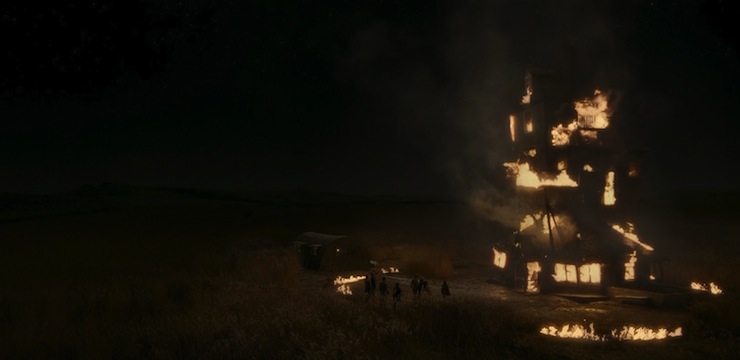
(The point of this scene was to try and show how the Death Eaters were terrorizing England, as a replacement for all the looking through newspapers in the book. It was an ill-conceived trade-off, one of those keys places where showing rather than telling was an unbelievable mistake.)
Back at school, it gets weirder. Harry finally realizes that his textbook might be kind of evil after using Sectumsempra on Draco, and everyone tells him to get rid of it. So Ginny grabs Harry and drags him to the Room of Requirement, where she hides the book for him so he won’t “be tempted.” (Hur hur.) And then she kisses him while his eyes are closed, and tells him that can also be a secret kept in the Room of Requirement, and I’m like eeeeewwww, this is terrible and icky and nothing like Ginny, and I want a refund. What happened to the girl who rushed Harry after a Quidditch match because she knew what she wanted and knew he was ready for it? (Answer: they gave that kiss to Ron and Lavender instead.)
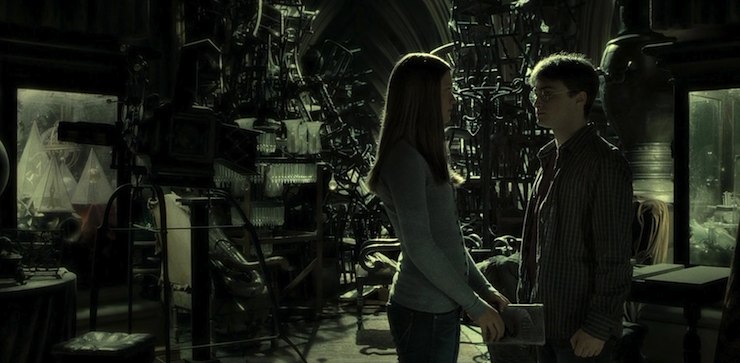
This is made even more aggravating when, instead of leading Harry away after Dumbledore’s death so he can fill everyone in on what happened, she just holds him next to the body while he cries. While I’m glad that the film had the good sense to realize that the battle between the Order members and the Death Eaters wasn’t plot essential (they didn’t want the end of Deathly Hallows to feel too similar either, which is a good point), it leads to Ginny coddling Harry throughout half of the movie. It speaks of a patent misunderstanding of what Ginny means to Harry at this point in his life—she’s not there to mop up his tears, she’s there because she lets Harry feel normal. She gives him a glimpse of what life is as a normal teenage boy who doesn’t have to worry about the fate of the world.
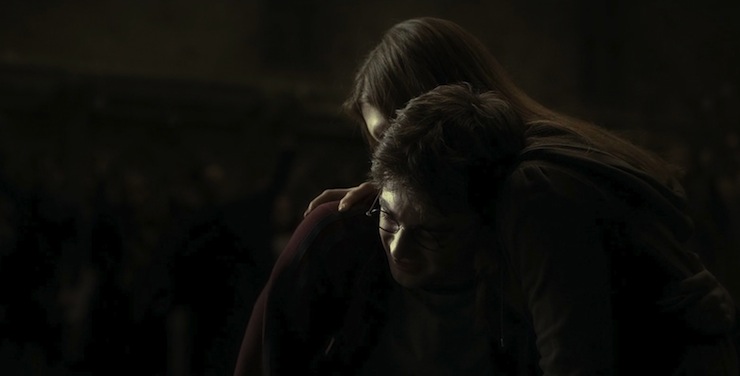
With the push of Scrimgeour’s scenes to the next film (Bill Nighy was already cast and then had to wait until Deathly Hallows Part I to film anything), this movie manages to miss out on most of the major emotional notes within the book; Harry’s declaration that he’s Dumbledore’s man, all the intimate moments between him and the Headmaster, the point where Harry understands that the prophecy does not determine the path he takes—it’s all erased.
Conversely, this movie is already setting up Snape as a tragic hero; Alan Rickman is framed in a completely sympathetic light throughout, the kindest they’ve ever portrayed the character, and it makes his reveal as the Half-Blood Prince fall flat. He lacks the outrage, the righteousness to make the drop feel important. Instead, we get a quiet admission and a swish offscreen, and the subtitle of the film suddenly feels kind of superfluous. (Also, they don’t explain why he’s the Half-Blood Prince, and it’s Prisoner of Azkaban all over again. I tried to explain it to my mom after we left the theater the first time. She didn’t get it.)
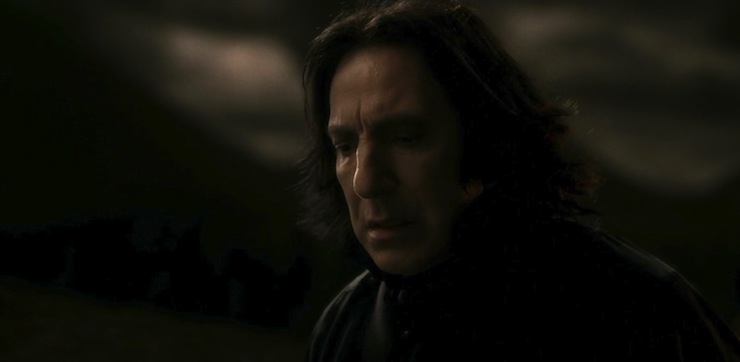
There was controversy over the change to Harry’s role at the end of the film. Some were annoyed that Harry did as Dumbledore asked and stayed down below (rather than being frozen under his Invisibility Cloak by Dumbledore beforehand), then allowed Snape to go up there in a rare moment of trust between them, ultimately leading to Dumbledore’s murder. I feel the choice was a practical one as well as a dramatic one; showing Harry frozen under the Invisibility Cloak would have been a tough thing to render on film. And frankly, adding the extra betrayal of Snape committing murder in the single moment when Harry chose to believe Dumbledore about his loyalties is an excellent emotional choice for the film to make. It’s a knife twist, and a poignant one. It’s different, but that doesn’t make it bad.
On the other hand, I’m less impressed with Dumbledore’s impromptu funeral on the grounds. In the book, the students hear the battle in the hallways, so they have a reason to come out and investigate, and everything’s appropriately chaotic when they discover their dead headmaster. Here, everyone somehow gets the memo to come outside and gather around Dumbledore’s body in a completely orderly fashion, and they’re all helpfully stoic and sad but not freaking out, and then they all light their wands and point them to the sky, and together, all those lights manage to obliterate the Dark Mark hanging over the sch—OH COME ON, ARE YOU KIDDING? THIS VISUAL METAPHOR IS WORSE THAN THE STAIRCASE SCENE IN ORDER OF THE PHOENIX. ‘BUT THIS MANY LIGHTS, WORKING IN UNISON, WILL OVERCOME THE DARK THAT HAS DESCENDED—’ STOP. JUST STOP. IT LOOKS VERY PRETTY, BUT YOU SHOULD STILL BE ASHAMED OF YOURSELVES.
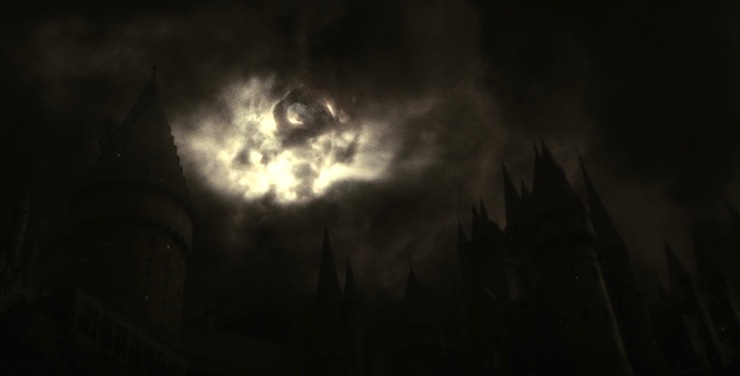
And afterward, we have Harry and Hermione standing around, talking about the Horcruxes and Draco and other stuff. Harry tells Hermione he’s not coming back to school next year, and that he’ll write, and she tells him he’s an idiot for not realizing that she and Ron are coming along. And you’re like ‘hey, that’s a good point, where is Ron?’ and then the camera pans and he’s just sitting nearby with this semi-vacant expression on his face, not saying a word because Steve Kloves continues to have this ridiculous bias about Ron and gives every single heartfelt moment the character has to Hermione, and it continues to be the biggest failure of these films by far. They had one of the best book endings to work with due to he and Hermione stepping up, and instead he’s just squatting on the stairs with no zero opinion about potential death quests either way.
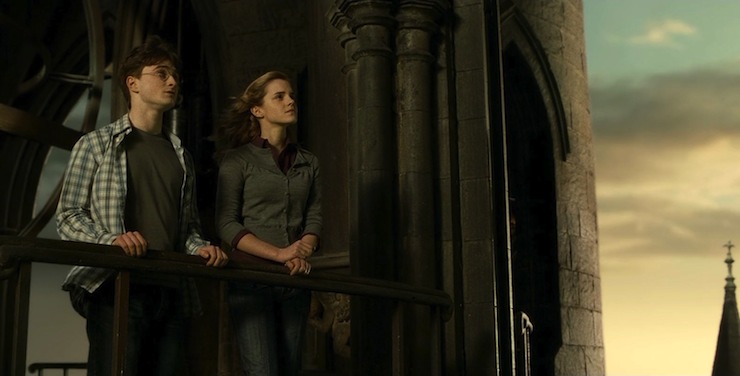
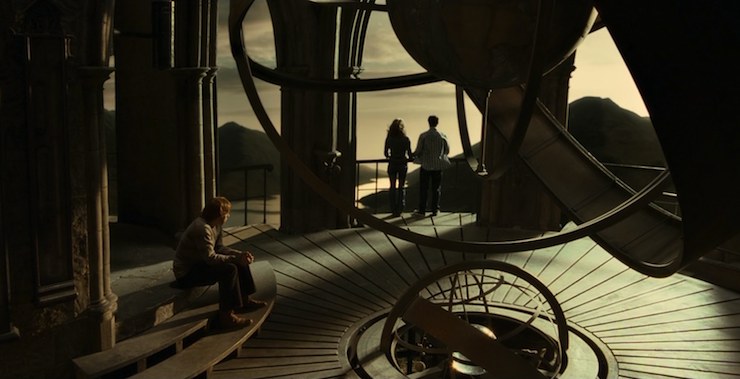
And then the trio go over to the railings (except Ron, who stands dutifully a few paces behind Harry and Hermione like the human-equivalent-of-a-puppy that he’s meant to be, like are you serious with this?) and Harry’s like, wow, I never noticed that the Hogwarts grounds were so pretty because we’re six chapters in and WE STILL HAVE NO IDEA HOW TO END A MOVIE, GREAT JOB GUYS, I’M SO GLAD HARRY FOUND A WAY TO APPRECIATE BEAUTY BEFORE HIS DEATH QUEST.
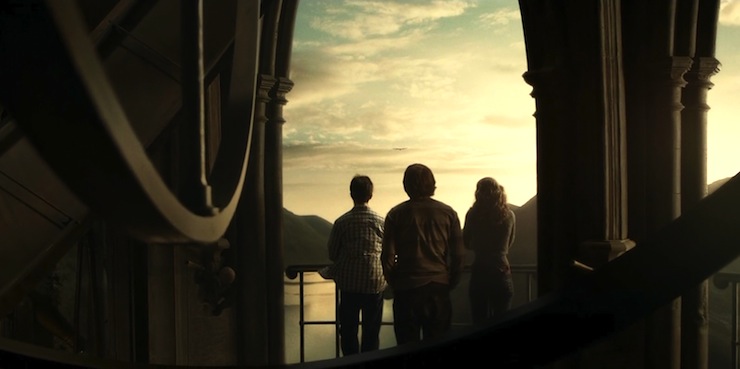
*headdesk*
Emmet Asher-Perrin cannot believe how difficult these endings are, seriously. You can bug her on Twitter and Tumblr, and read more of her work here and elsewhere.










